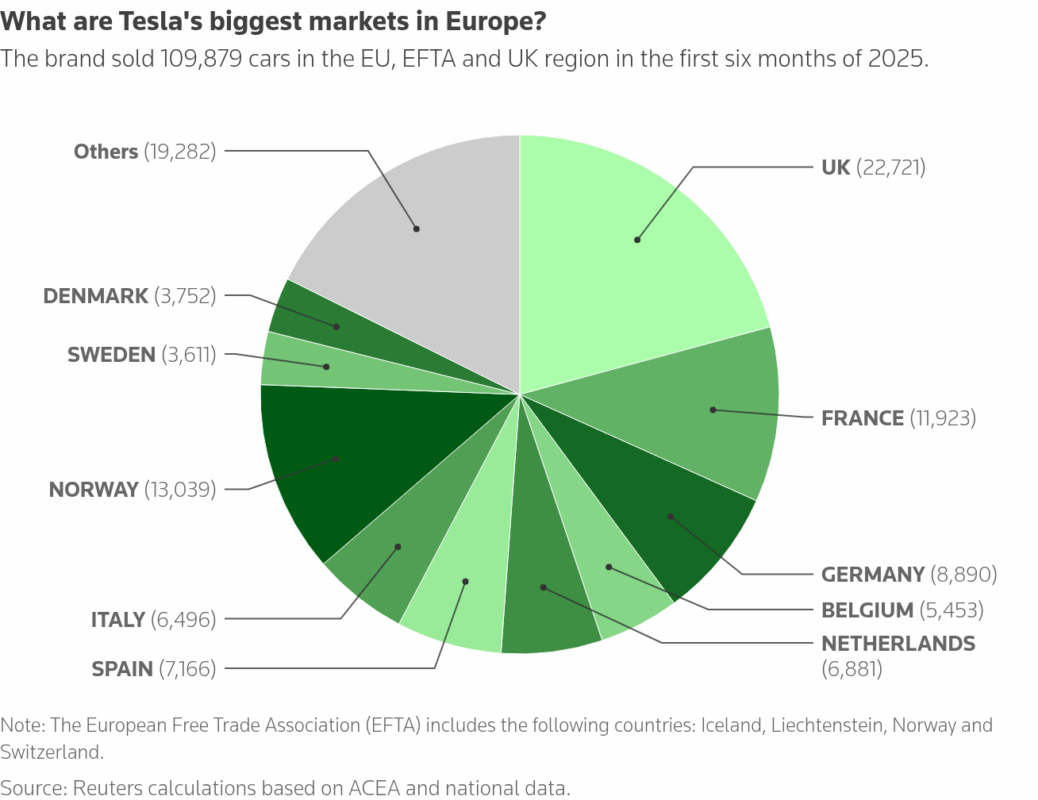In a sharp reversal of fortune, Elon Musk has seen a staggering $68 billion wiped from his net worth in just 48 hours, amid mounting investor concerns and plummeting Tesla sales across Europe. The data, first reported by Reuters, reveals how deeply political controversy and strategic missteps are impacting the world’s most recognizable electric car company.
Tesla Sales Plunge Despite EV Market Growth
According to Reuters, Tesla’s European sales fell by 45% on average in July compared to the same period last year. The drop is most severe in Germany (-55%) and the United Kingdom (-60%), both considered vital markets for the brand. These declines are especially glaring when compared to the wider electric vehicle (EV) market, which grew by 58% in Germany and 9% in the UK over the same period.
Tesla’s dramatic downturn appears to be decoupled from broader EV demand, pointing to issues specific to the brand rather than market conditions. Competitors are not just catching up—they’re surging ahead. BYD, the Chinese EV giant, has become one of the biggest beneficiaries. In Germany, BYD’s sales have quintupled, while in the UK they have quadrupled, signaling a clear shift in consumer preference.

 A pie chart showing Tesla sales in some of its biggest markets in Europe. Credit: Reuters/ACEA
A pie chart showing Tesla sales in some of its biggest markets in Europe. Credit: Reuters/ACEARobotaxi Reveal and Model Y Overhaul Backfire
The financial damage isn’t just from sales—it’s investor sentiment. Earlier this month, Tesla unveiled its long-promised robotaxi, a project Musk has hyped for years as the future of transportation. But instead of excitement, the presentation triggered a sell-off, wiping $68 billion from Tesla’s market value in just two days. The announcement appears to have raised more doubts than confidence, especially as the company offered few specifics on timelines or scalability.
Simultaneously, Tesla rolled out a redesigned Model Y, the brand’s best-selling vehicle. Market reaction was muted. The refresh lacked significant innovation and failed to stand out in an increasingly competitive segment. “There’s a crisis of confidence,” L’Indépendant notes, citing both failed product momentum and weak delivery numbers as central to investor concerns.
Political Fallout Is Alienating Consumers
While product performance plays a role, Elon Musk’s increasingly politicized persona may be doing even more harm to Tesla’s image—especially in Europe. Once known as a visionary entrepreneur, Musk has become a polarizing figure, often making headlines for inflammatory statements and online clashes. His fluctuating relationship with Donald Trump, including a public fallout earlier this summer, reportedly cost him $100 billion in a single day, according to past estimates.
This kind of exposure has started to erode consumer trust and brand appeal, particularly in markets less aligned with Musk’s political leanings. European buyers, more focused on environmental standards and tech reliability than political theatrics, appear to be turning to more neutral brands like BYD and Hyundai.
Tesla’s Position in Europe Is Now Deeply Uncertain
Europe once represented a significant growth engine for Tesla, especially as the region aggressively pushes toward EV adoption. But with falling sales, rising competition, and reputational damage, Tesla’s footing now looks increasingly unstable. Whether the company can regain its lead will depend on two things: its ability to deliver meaningful product innovation, and whether Elon Musk can decouple his personal brand from his business.
For now, the numbers are telling a clear story. Tesla isn’t just struggling—it’s losing ground rapidly in one of the world’s most lucrative EV markets. And unless the company can regain investor confidence and reestablish consumer trust, Europe may no longer be Tesla’s playground—but BYD’s.
